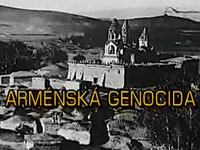|
text k videu
World War One gave the Young Turk government the cover and the excuse to carry out their plan. The plan was simple and its goal was clear. On April 24th 1915, commemorated worldwide by Armenians as Genocide Memorial Day, hundreds of Armenian leaders were murdered in Istanbul after being summoned and gathered. The now leaderless Armenian people were to follow. Across the Ottoman Empire (with the exception of Constantinople, presumably due to a large foreign presence), the same events transpired from village to village, from province to province.
The remarkable thing about the following events is the virtually complete cooperation of the Armenians. For a number of reasons they did not know what was planned for them and went along with "their" government's plan to "relocate them for their own good." First, the Armenians were asked to turn in hunting weapons for the war effort. Communities were often given quotas and would have to buy additional weapons from Turks to meet their quota.
Later, the government would claim these weapons were proof that Armenians were about to rebel. The able bodied men were then "drafted" to help in the wartime effort. These men were either immediately killed or were worked to death. Now the villages and towns, with only women, children, and elderly left were systematically emptied. The remaining residents would be told to gather for a temporary relocation and to only bring what they could carry. The Armenians again obediently followed instructions and were "escorted" by Turkish Gendarmes in death marches.
The death marches led across Anatolia, and the purpose was clear. The Armenians were raped, starved, dehydrated, murdered, and kidnapped along the way. The Turkish Gendarmes either led these atrocities or turned a blind eye. Their eventual destination for resettlement was just as telling in revealing the Turkish governments goal: the Syrian Desert, Der Zor.
Those who miraculously survived the march would arrive to this bleak desert only to be killed upon arrival or to somehow survive until a way to escape the empire was found. Usually those that survived and escaped received assistance from those who have come to be known as "good Turks," from foreign missionaries who recorded much of these events and from Arabs.
|
x

Na počátku 20. století ještě neexistovalo slovo, které by pojmenovalo etnické čistky namířené proti jednomu národu. Osudem Arménů žijících v Turecku v roce 1915 bylo uvést ho do povědomí lidstva. Český dabing. Více se dočtete na Délský potápěč.
|
